How Does Art Grow After Motherhood?
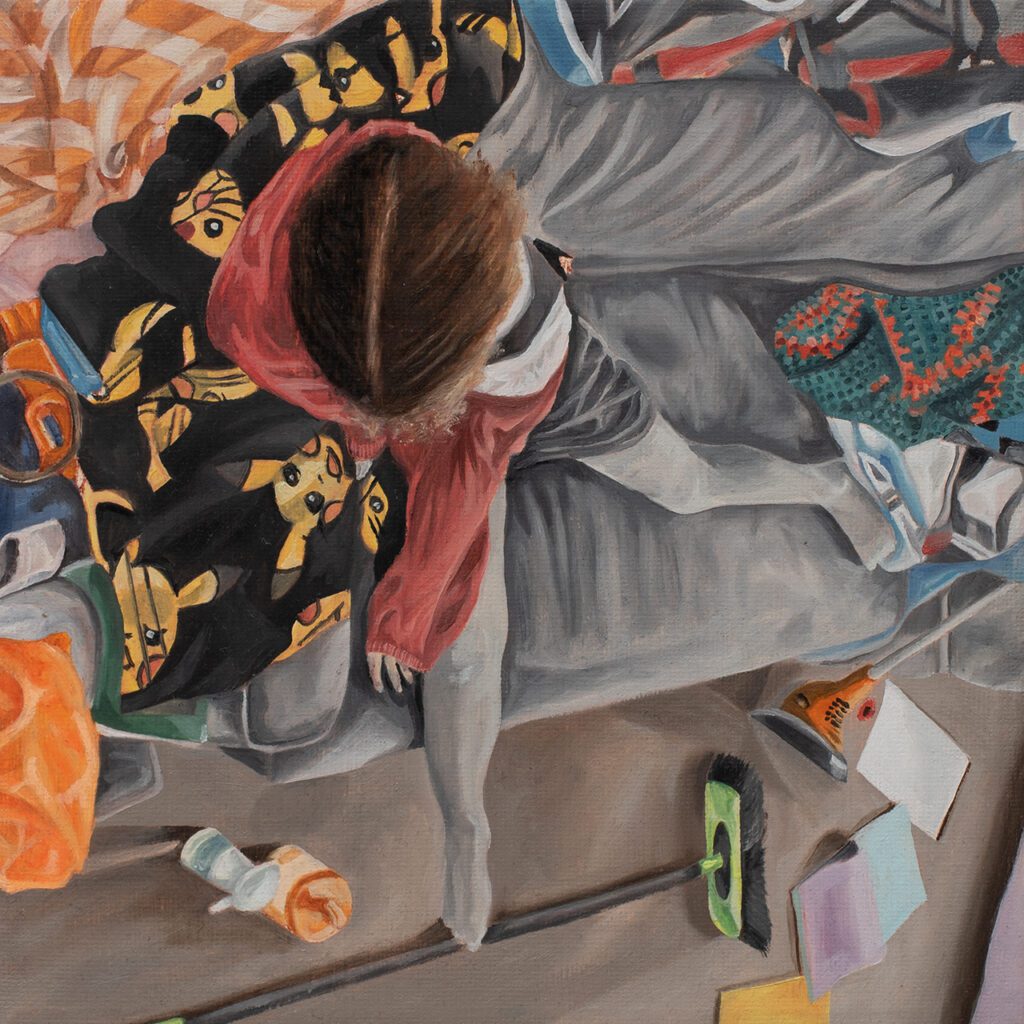
Here we meet Sharon James, a Black, queer mother based in rural Dorset who has returned to making work after several years away raising her children. In this interview, she discusses openly rebuilding a creative practice while parenting and how stepping away and then returning has sharpened her purpose rather than slowed her momentum. Her story is grounded in lived experience and a desire to record the everyday moments of family life that rarely make it into British art spaces, especially when those families look like hers.
Sharon speaks about raising children in a place where Black and queer families are seldom seen, and the steady insistence involved in being visible in such an environment. She shares why putting her family on the canvas matters not as a statement piece but as a natural part of life that deserves to be seen without explanation or apology. She highlights the responsibility she feels toward her children and how that sense of responsibility now guides her decisions and the meaning of legacy in her practice.
She also touches on her IVF journey and the conversations that surface when people encounter stories that fall outside traditional ideas of parenthood. By speaking about fertility and family through a lens often left out of these discussions, she invites people to reconsider who is included when we talk about belonging, care, and creation. Sharon also discusses her shift between figuration and abstraction, and how each mode serves a different need —one rooted in everyday observation, the other in feeling and instinct.
Throughout the interview, Sharon shows how creativity, family life and identity are intertwined rather than competing forces. She also discusses supporting global majority artists in Dorset and how that work has begun to slowly reshape conversations about who is seen in local cultural spaces. What we learn from her perspective is not only how she navigates being a mother and a maker, but also how she helps build a space for others to participate, to be noticed, and to feel part of the story.
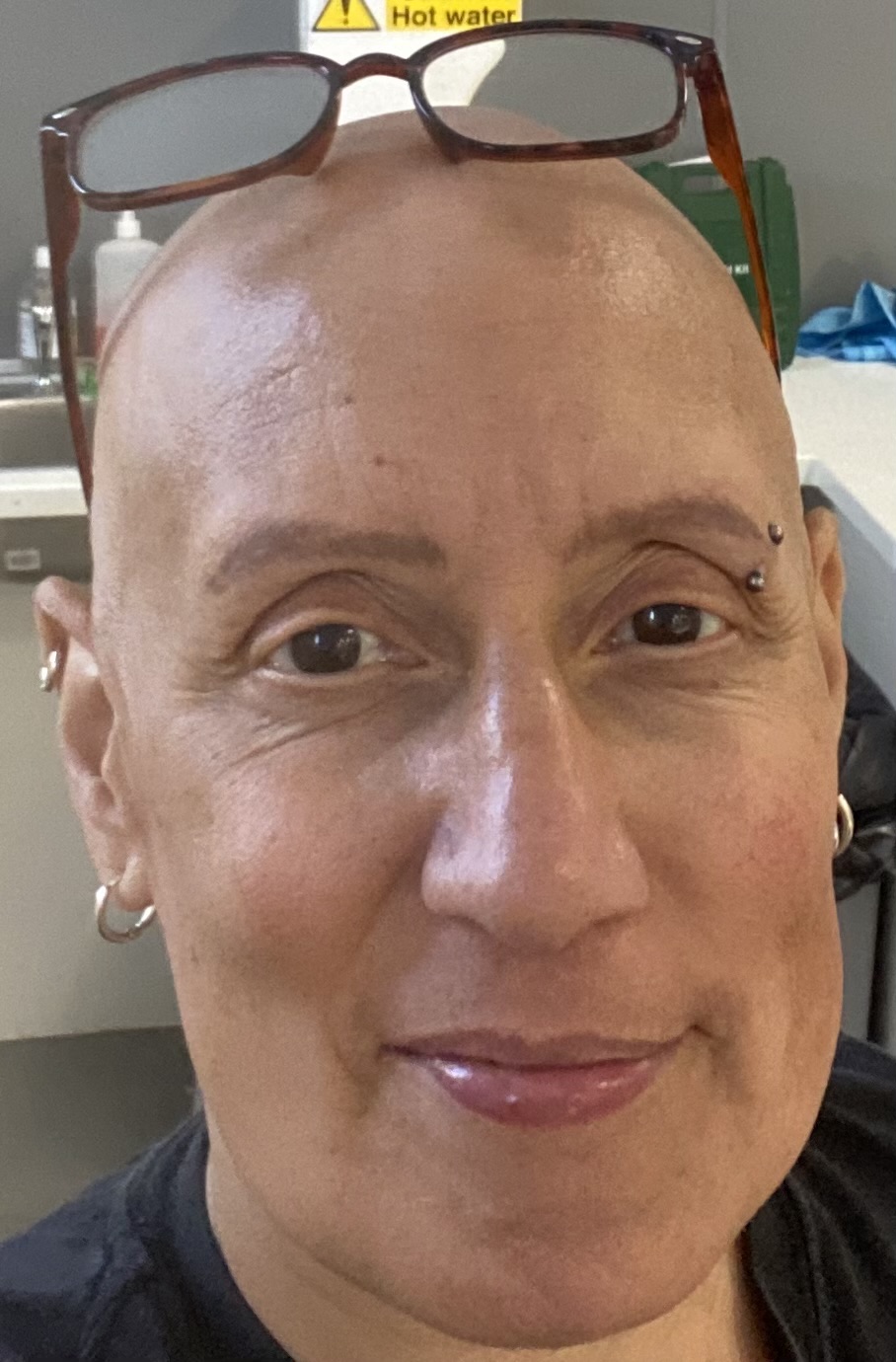
I am a Black, queer mother and re-emerging artist working in painting, drawing, and printmaking. After a seven-year hiatus following the birth of my children, my practice has evolved into a deeply autobiographical exploration of identity, belonging, and representation. My work reflects the layered realities of being Black and queer in predominantly white, rural Dorset—documenting experiences of motherhood, IVF (often seen as a white privilege), heritage, and sexuality.
I aim to make visible what is usually unseen: Blackness in everyday life, in parenting, in coastal communities, and in art itself. Driven by a desire to leave a lasting legacy for my children, my work navigates the intersection of the personal and the collective, reclaiming narratives and shaping what will become our shared story. Recent solo exhibitions—#Artistmother, The Art of Motherhood, and A Mother’s Legacy (2024). A Mother’s Legacy Part 2 and Background the exhibition in 2025. Background, which connects family history, place, and the weight of the past. My practice contributes to the evolving dialogue around race, queerness, and motherhood in contemporary British art.
1. After taking several years away from making work while raising your children, how does creating now feel different from before that break?
Motherhood has made my work more deliberate, more insistent, and more urgent. It has forced me to create within the limits of time and energy, yet those constraints have sharpened my focus rather than dulled it. My art has become a record of dual lives, where the artist and mother are intertwined, inseparable, and constantly reshaping one another. Before I had children, I never really thought about legacy. Now it’s a quiet preoccupation: the act of visually documenting our lives, of representing us, of making the images that were missing from my own childhood memories. I want my children to see people who look like them loved, present, and central, and to know that their stories, our stories, belong in the frame.
Our family might look like any other family children playing, small domestic rituals, moments of tenderness but within that ordinariness lies something quietly subversive.
Sharon James

2. What has it been like to paint stories of Black and queer family life in a place where people rarely see that around them?
Whilst it’s not necessarily apparent that my children have same-sex parents within my work, I make sure that it’s acknowledged wherever my work is shown—visibility matters. Our family might look like any other family: children playing, small domestic rituals, moments of tenderness. But within that ordinariness lies something quietly subversive. We challenge assumptions simply by existing in that space of normalcy. Part of my intention is to present images of family life that are both familiar and quietly radical.
I want viewers to recognise the universality of love and care while also questioning what society has traditionally defined as “normal.” By depicting my family without fanfare or overt explanation, I allow our differences to exist naturally within the frame; yet, I proudly claim that difference in conversation and context. In doing so, I hope to expand the visual narrative of motherhood and family to make space for more inclusive representations that mirror the richness and diversity of real life. My work becomes not just about personal experience, but about presence, about taking up space where we haven’t always been seen.
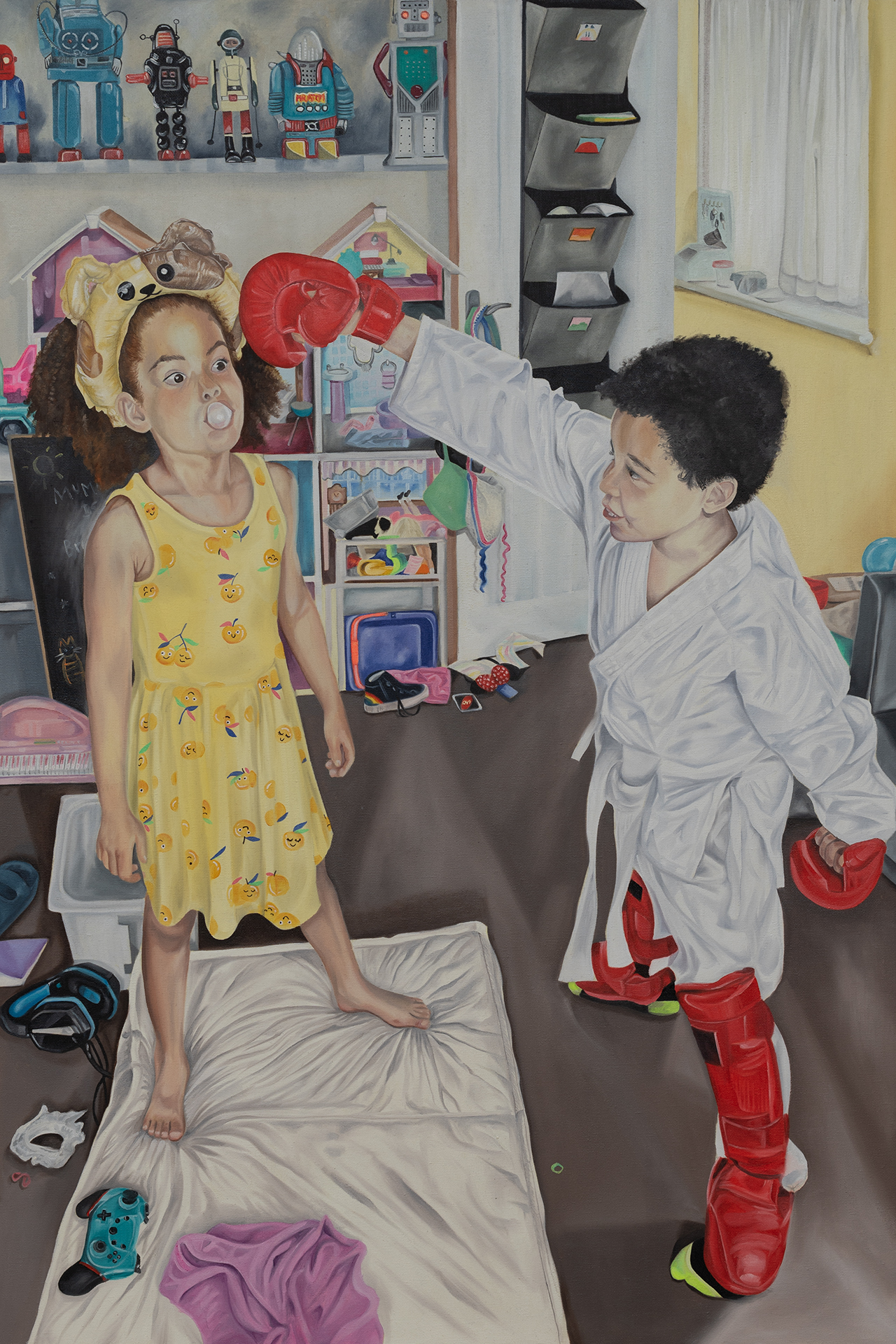
3. “Blackground” brings together family history, place and the weight of the past. How do you decide what parts of those stories to bring forward in each piece?
“Blackground” is an ongoing project, one that may never truly be finished. I work intuitively, responding to moments that demand expression. Though the work is grounded in extensive research, each piece must still hold together as a composed image. I’m constantly navigating the tension between what must be said and what must be felt.

4. When people encounter your IVF journey and queer parenting in your paintings, what kinds of conversations tend to happen?
My work around IVF has resonated with many people because it doesn’t just explore the medical process itself, but the emotional terrain of longing, hope, and becoming a parent. It has sparked conversations about queer parenthood and its impact on our daily lives and sense of belonging. It feels vital to explore this in my work because stories like mine have often been overlooked in the broader narrative of parenthood. IVF, as a practice and as an image in popular culture, has historically centred white, heterosexual experiences.
By bringing my own perspective into that space, I’m challenging what has been seen as the “norm” and expanding who gets to be visible within these stories. As a queer parent, I want my work to make space for others to see themselves reflected — to recognise that our experiences of love, family, and creation are as ordinary as they are extraordinary. Art has the power to humanise and normalise, to soften assumptions and to invite empathy. For me, this project isn’t just about representation; it’s about claiming visibility and reframing what family can look like.
Motherhood has made my work more deliberate, more insistent and more urgent.
Sharon James
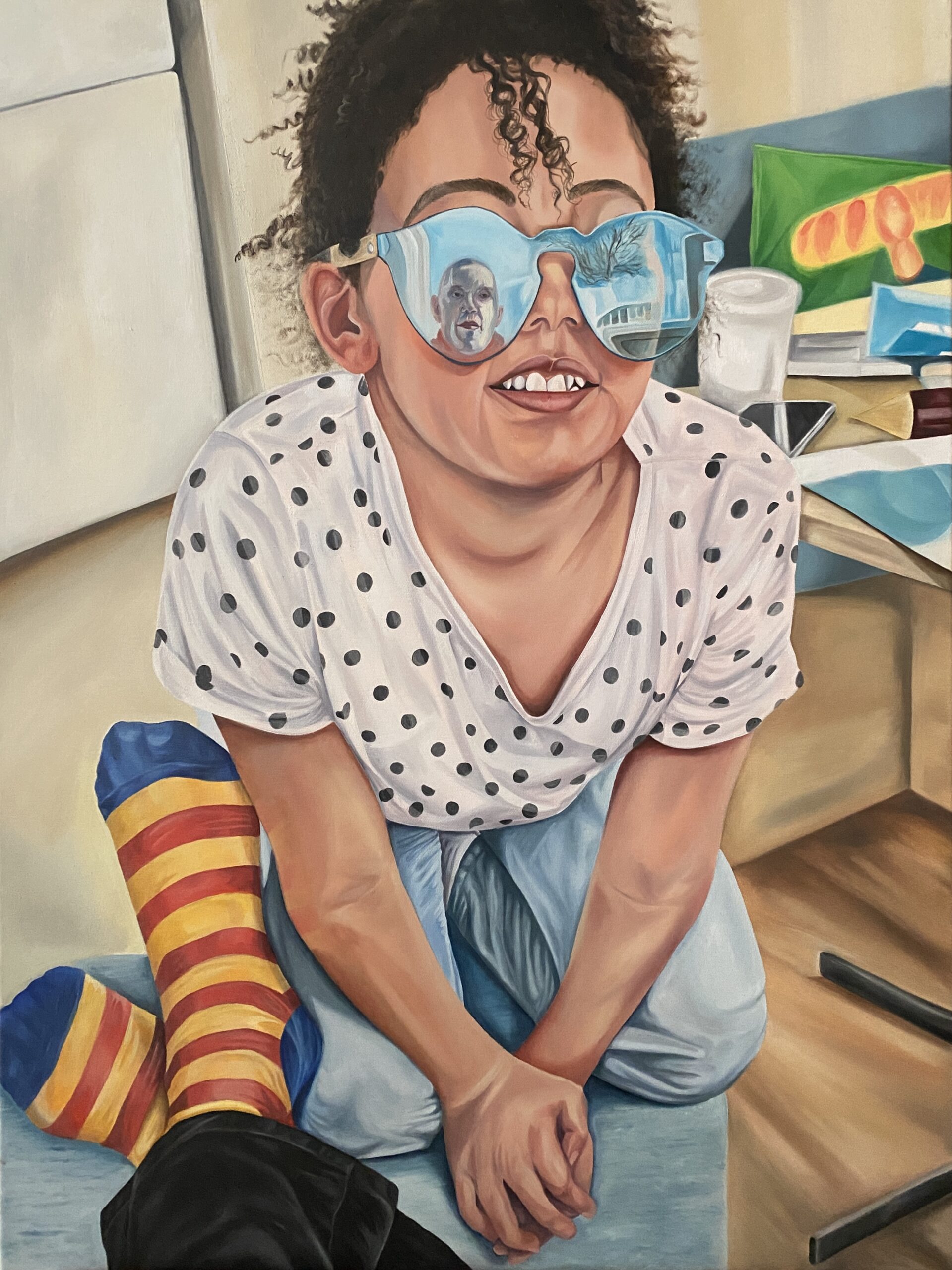
5. You switch between painting figures and making abstract work. What leads you toward one approach rather than the other at any given moment?
My creative process is shaped by lived experience and observation, using storytelling to bridge the personal and the collective. Whether through figurative representation or symbolic abstraction, my work creates a space for reflection and dialogue, inviting viewers to consider their own familial connections and histories. When I work abstractly, the process comes entirely from within — there’s no external reference, just intuition and emotion. It’s about bringing something into being that has never been seen before. My figurative work, on the other hand, is evocative and narrative-driven, grounded in the rhythms and realities of everyday parenthood. Both approaches fulfil different needs within my creative process: abstraction allows for freedom and introspection, while figuration offers connection and storytelling.
6. Through your role supporting global majority artists in Dorset, what changes have you noticed in how people talk about representation and who gets to be seen in the local art scene?
My work with global majority artists has helped to shift the conversation around representation in Dorset from one of absence to one of presence and visibility. For too long, artists from the global majority have been underrepresented or tokenised in local arts spaces. Through my role and collaborations, I’ve worked to build platforms where their voices and experiences are not just included, but centred.
It’s about creating opportunities for dialogue and understanding—ensuring that exhibitions, events, and networks accurately reflect the true diversity of our communities. What has been powerful is seeing how this has encouraged institutions to look inward, to question their own practices, and to begin to make lasting structural changes rather than short-term gestures. It’s slow work, but it’s starting to shift how Dorset sees itself and who feels they belong in its cultural spaces.
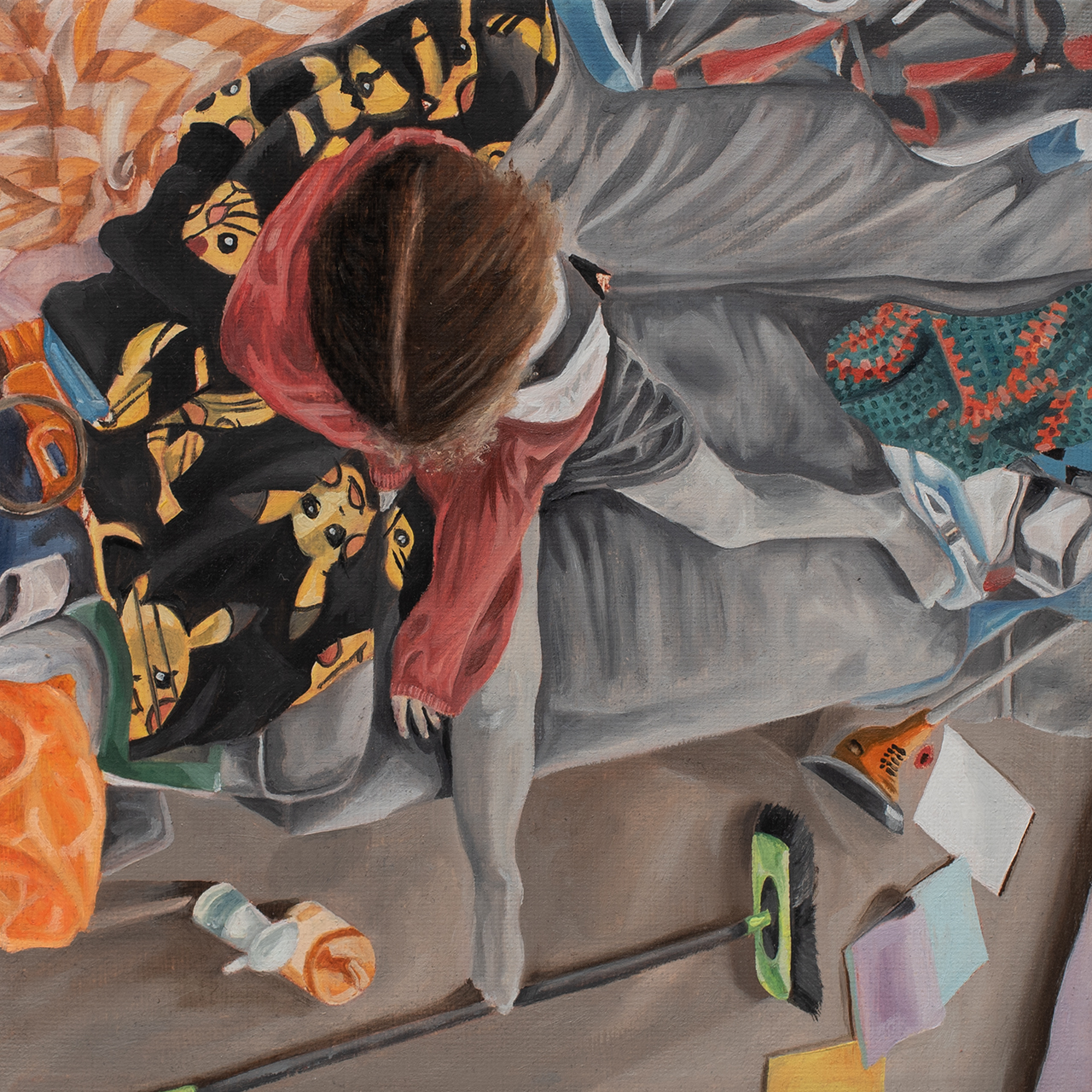
Sharon’s practice centres on family life, identity and a sense of place, especially in a part of the country where stories like hers are rarely seen. Through painting, drawing and printmaking, she traces everyday scenes and lived moments, trusting that ordinary life carries value and deserves to be noticed. Her journey reveals what it’s like to return to making after raising children and how purpose can sharpen with time away.
We learn about the realities of queer parenting in a rural setting, the emotional and practical landscape of IVF, and the steady commitment required to take up space where history has overlooked so many. Sharon shows us that making work can be about building a record, leaving something for those who come after, and shaping space for others to step into — not through grand gestures, but through steady presence and intention.
To learn more about Sharon, visit the links below.
